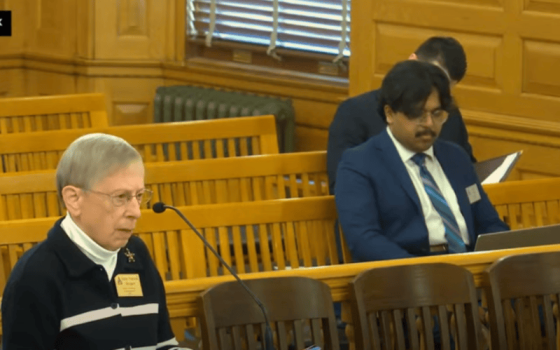
LUMPKIN, GA. -- Traveling down Interstate 85 and Interstate 185 into the Deep South, the desolation of the journey along almost-empty highways makes one wonder if the Stewart Detention Center will ever appear. Touted by critics as the largest private, for-profit prison in the northern hemisphere, Stewart is the prison where thousands of Latino immigrants are held for almost certain deportation, most of them for minor traffic violations.
Located about 145 miles south of Atlanta, Stewart holds close to 2,000 immigrants and costs taxpayers $65 per inmate per day. It also represents the arbitrariness of U.S. immigration policy, especially at the state level, at a time when many Georgia and Alabama farmers are unable to find help as Latino workers flee to safer environs.
At the maximum-security prison, family members of Stewart detainees are not allowed contact visits. Because they're undocumented, most detainees are given no access to attorneys to make their case for asylum. On Nov. 18, as part of the kickoff to the annual School of the Americas Watch weekend of events at Ft. Benning in Columbus, Ga., about 200 people traveled to Lumpkin, about 40 miles south of Columbus, on a cold fall morning for a rally and to march 1.5 miles to the detention center.
Bryan Babcock, who lived for a year in Lumpkin to help operate el refugio, a house of hospitality for families of the detainees, said it's a strategy of Immigration Customs Enforcement to isolate detainees far away from any support networks. Stewart actually has more prisoners than Lumpkin has residents, Babcock said.
"It's definitely an intentional thing to put private prisons in areas that are either desolate or far from anything else, and the reason for that is they don't want a lot of people to know about it," Babcock said. "They're also looking to employ people who may not have the same access to education.
" ... One of the reasons we have a hospitality house here in town is because there are no hotels or any place for the families of people in the detention center to stay when they come visit," Babcock said. "There's barely anywhere to eat in this town, either, so we offer a free hospitality service where they can stay with us for free or they can just come and eat lunch with us for free."
Babcock, who lived with his wife, Christin, in the house, said his faith motivates his work for immigrant justice.
"As followers of Jesus, we need to be hospitable. We also need to be welcoming to the stranger," he said.
Clinging tightly to her husband, Pedro Guzman, Emily Guzman is one of the very few lucky ones. After being held at Stewart for 597 days, an immigration judge gave Pedro his freedom. He was released May 17.
At a rally outside the gates of Stewart, Emily, now five months pregnant, cried often as she recounted her 500-mile trips from Durham, N.C., to Stewart with her preschool son, Logan, to visit Pedro.
Corrections Corporation of America, the company that operates Stewart, "profited almost $60,000 off my husband," Guzman said.
When Pedro was released, Logan asked his mother if all of the "other mommies and daddies are getting out, too?"
"The heartbreaking truth is that there are so many immigrants still unjustly detained," Emily said. "Most cannot fight. Pedro is free but so many are not.
"For the first six months, I was scared to speak out. My anger and frustration took over, and I cast my fear aside. The system is broken and based on fear. Coming together in courage and love -- speaking out together -- we can accomplish human rights for immigrants. Our family is reunited, but we will keep speaking out until every family is free."
Pedro told the crowd Stewart detainees get no respect from the guards.
"This place is made to break your soul," he said. "We wake up every morning with loud screams from the guards."
Glenmary Home Missioners Fr. Les Schmidt from Virginia works as the justice issues liaison to the 48 Southern Catholic bishops.
Schmidt said many U.S. religious bodies and clergy are speaking out against the persecution of undocumented immigrants, but in tough economic times, that's a hard sell to the folks in the pews.
"The Methodists made it very clear that it's immoral to profiteer off of those behind bars," Schmidt said. "The Presbyterians called for federal legislation to ban for-profit private prisons."
The U.S. Catholic bishops support "a pathway to citizenship for the more than 11 million immigrants who right now are forced to live in the shadows," he said. "What we need to show is solidarity. With God there are no outsiders. Everyone belongs.
"People are detained mostly for having no papers. They are picked up, imprisoned and really treated like dogs. This is the largest for-profit private prison in the northern hemisphere."
Schmidt said it's not unusual for pastors to find a divided congregation ("very much divided") on immigration. The bad economy adds fuel to the anti-immigrant fire, Schmidt said.
"They need somebody to blame, and the first ones that come up are the Latinos, even though we are a nation of immigrants," he said. "But we tend to have short memories and because of that, yes, the division in the parishes, in the pews, is clear and noticeable."
The rally and march were sponsored by Georgia Detention Watch, a coalition of human rights and immigrant rights groups. Anton Flores-Maisonet, master of ceremonies at the events, said GDW became affiliated with SOA Watch three years ago, and they are "pulling inspiration" from SOAW, which has monitored U.S.-Latin American policy for more than two decades.
Babcock said the fifth annual rally and march was another step forward in the effort to shut down Stewart.
"What gives me hope is groups of people like this that have educated themselves completely on the topic and understand that something is wrong here with the way that we are treating fellow human beings," he said. "I think movements like this are they only way we're ever going to change anything."




